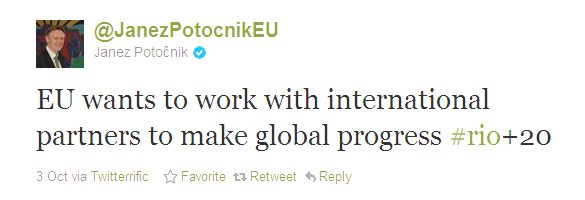European Commissioner for the Environment Janez Potocnik is currently in New Delhi, India discussing ways to allow for a Green Economy and Inclusive Growth with other high level officials and experts.
Certainly, the challenge is not exactly new, but it remains a major obstacle in international climate negotiations: How to enable further economic development, food and energy security for emerging economies and the Global South, while limiting the depletion of natural resources and the use of carbon-intensive energy?
Less developed countries rightly expect support in this challenge by those countries that have created it in the first place, the EU countries among them. And – at least in my optimistic interpretation – Potocnik suggest in one of his frequent twitter updates from India that the EU is willing to reach out to offer support.

This would be laudable, but as we all know, large amounts of this kind of support are channeled through multilateral development banks – and herein lies the problem!
No doubt, energy security and green economy are very high on the EU’s agenda as well (pdf). But if the European public banks support the same kind of “green economy” in the Global South that they allegedly support in their own backyard, then we’re in for a very dark shade of green, a carbon black one in fact.
The European Investment Bank (EIB) and the European Bank for Reconstruction and Development (EBRD) continue to invest European public money in coal power plants both in Europe and elsewhere:
- There is, in Potocnik’s home country Slovenia, the Sostanj lignite power plant, which alone would swallow up almost the country’s entire carbon budget by 2050.
- There is a coal-fired heat and power plant in Poland and potentially more, since Poland is planning to continue relying on coal.
- There is the Kolubara lignite mining complex in Serbia, where even a more efficiently produced lignite will still be one of the dirtiest energy sources.
These are only a few examples for a deeply rooted lack of commitment within these financial institutions to roll up their sleeves and firmly support renewable energy. They should finally become a part of the solution of the global climate challenge instead of locking energy sectors into fossil fuel schemes.
Original image courtesy of flickr user framboise – released under a creative commons licence.
Never miss an update
We expose the risks of international public finance and bring critical updates from the ground – straight to your inbox.
Institution: EBRD | EIB
Theme: Energy & climate
Location: Poland | Slovenia | Serbia | India
Tags: European Commission | energy | energy security | fossil fuels

